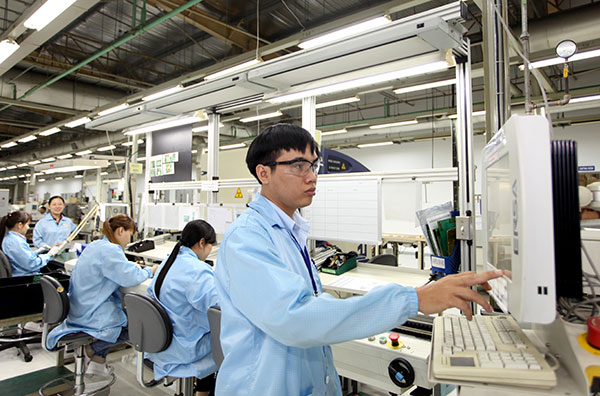Vietnam’s FDI perspective strong after US elections?
 |
Trump said he would take a protectionist approach to free trade agreements. The prospects of the ratification of the Trans-Pacific Partnership Agreement (TPP), an accord enumerating the US and 11 Asia-Pacific countries including Vietnam, is now less certain.
VIR asked foreign companies about their sentiments regarding investing in Vietnam in the upcoming months or years and about what impact the Trump presidency may have on future US investments in the country:
Steve Lamar - Executive vice president of the American Apparel and Footwear Association
 The apparel and footwear industry is constantly looking for ways to improve its supply chains, both in efficiency and sustainability. While the immediate fate of the TPP remains unclear, we continue to support its provisions and advocate for its approval and implementation.
The apparel and footwear industry is constantly looking for ways to improve its supply chains, both in efficiency and sustainability. While the immediate fate of the TPP remains unclear, we continue to support its provisions and advocate for its approval and implementation.
We believe it is important that the promise of the TPP – and the benefits it would confer on Vietnam, the US, and the other 10 countries – not be lost. We will also work with the new Trump Administration and the 115th Congress to advocate for policies that will support a competitive US apparel and footwear industry that reduces barriers to trade and supports our supply chain partners in Vietnam and elsewhere.
David Blackhall - Managing director of VinaCapital
 The victory of Donald Trump in the race for US President has unsettled the world’s markets as Trump is a blank slate in terms of how he might govern, although some of the positions he espoused during the campaign promise to upend the world order of the past decade. While it remains to be seen how his campaign positions materialise into policy, the following is VinaCapital’s preliminary take on how a Trump administration could affect Vietnam in several key areas over the next 12 months.
The victory of Donald Trump in the race for US President has unsettled the world’s markets as Trump is a blank slate in terms of how he might govern, although some of the positions he espoused during the campaign promise to upend the world order of the past decade. While it remains to be seen how his campaign positions materialise into policy, the following is VinaCapital’s preliminary take on how a Trump administration could affect Vietnam in several key areas over the next 12 months.
The passage of the TPP – already in doubt before the election – now appears to be out of the question. One will recall that various estimates put the impact of the TPP on Vietnam’s GDP at +11 per cent over the next ten years. Furthermore, the prospect of TPP was seen by many as the impetus for the high amounts of foreign direct investment (FDI) that Vietnam has recorded over the past few years.
Obviously, the lack of the TPP will affect some future investment, particularly in the textiles and apparel sector, which was largely seen as the biggest beneficiary of the trade pact. Nevertheless, we believe that FDI will continue to be strong. First, Vietnam’s macro-economics are on reasonably stable ground for continued growth and the country offers a stable government. Second, Vietnam’s labour costs continue to be low – about half those of China’s – and that is not likely to change in the short- or mid-term. Third,Vietnam’s large and young population, both as a pool of labor and as a steadily more affluent market, is an attractive demographic that is too good to pass up.
Korean and Japanese companies in particular have been the largest investors in Vietnam, investing an estimated $84 billion over the past two decades, well before the TPP was on the table. It is irrational to believe that they will look to unwind those investments or significantly change their strategies now that it is off the table.
Furthermore, Vietnam will benefit from the other free trade agreements which it has entered, including those with the EU (which remains on track to take effect in 2018), Korea, Russia, and the AEC, to name a few. Vietnam’s global integration will continue, with the TPP or without.
From a broader trade standpoint, Trump’s protectionist themes bear monitoring. On the campaign trail, he threatened to impose a 45 per cent across-the-board tariff on Chinese imports and a 35 per cent tariff on Mexican imports; it remains to be seen if Vietnam might be caught up in the protectionist frenzy. The US is Vietnam’s second largest market (after the EU), accounting for 23 per cent of all exports, with textile and footwear comprising 43 per cent or $12 billion of total exports to the US during the first nine months of 2016, according to government data.
Hit by high tariffs in the US, Chinese companies could send their products in higher quantities to Vietnam, particularly steel (some types of which are already subject to anti-dumping tariffs in Vietnam) and other construction materials, for which demand is expected to remain high for the next several years due to continued property and infrastructure development. This would put pressure on the average selling prices. We would expect the Vietnamese government to closely monitor any such moves, and impose additional tariffs if warranted. Meanwhile, Vietnamese companies that produce goods that compete with those produced in China could face stiffer competition.
Greg Ohan - Business development director of JLL Vietnam
 It’s fair to assume that global stock market chaos will have an impact on local markets at least in the short term however much of this will be a reaction to the election and driven by sentiment. Investors should prepare for the worse but we advise to keep the big picture longer term in mind.
It’s fair to assume that global stock market chaos will have an impact on local markets at least in the short term however much of this will be a reaction to the election and driven by sentiment. Investors should prepare for the worse but we advise to keep the big picture longer term in mind.
In the short term, the most immediate transmission mechanism is currency – where we might expect some volatility, as the news is digested and risk is assessed.
At time of writing, the US dollar is down, we may expect to see the yen appreciate as it could be viewed as a safe haven. In the medium term, some commentators suggest that the Presidency, House and Senate all under Republican control, would strengthen the US dollar which in turn makes Vietnamese exports more difficult and less attractive which would not be very supportive of our growing industrial export sector - however time will tell.
As the leading real estate Services provider in the country and a US Fortune company, JLL Vietnam is in growth mode and we expect this trend to continue. The majority of our business is fueled by foreign investment and regardless of election results, the economic indicators appear to be in favour of this continued trend particularly from foreign manufacturers which accounts for over 70 per cent of registered foreign direct investment in 2016.
Positive bilateral trade and increased investment interest in Vietnam particularly from the industrial sector to continue. While many observers are concerned regarding the impact this may have on US globalisation policies and trade agreements such as the TPP, history has shown that while political persuasions may change, the underlying sound factors driving investment into Vietnam will fundamentally remain and continue to attract global companies.
Regardless of political shifts in other regions, here in Vietnam we continue to see strong growth based on domestic demand, demographics and urbanisation. Increasing volatility and risk should push investors towards greater diversification making markets such as Vietnam which are more stable and offer steady long term growth more attractive.
Yields are increasingly global, rent growth is local. Therefore this provides sufficient reason in the longer term for diversification into Vietnam real estate for investors seeking the rent growth driven by demand for space and investment by both local and foreign multinational companies.
Kenneth M Atkinson - Executive chairman of Grant Thornton (Vietnam)
 It would appear that most major markets have responded positively to the election of President Elect Trump and it would seem logical that the Vietnamese stock market would follow suit.
It would appear that most major markets have responded positively to the election of President Elect Trump and it would seem logical that the Vietnamese stock market would follow suit.
However, for companies that were seen to benefit from the TPP and if this was somehow reflected in the price, then it could be that those shares may be adversely affected as it seems unlikely that the President Elect Trump will approve the TPP at least in the short - midterm.
FDI and trade is a little more difficult, depending on the industry sector. For US companies looking at the potential of the domestic market then it is unlikely that there will be any impact. For those companies who are looking at investing in Vietnam to take advantage of the tariff reductions and other benefits under the TPP, then for sure there will be a negative impact. However, overall with the Asean Economic Community and the coming into effect of the EU Vietnam FTA in 2018, there is unlikely to be a major negative impact on FDI.
On the trade side it is really too early to really tell as this will depend whether or not the President Elect pushes through with his plans for higher tariffs on countries like China and whether that policy would extend to Vietnam.
Nguyen Viet Ha - Managing director of BowerGroupAsia
 Trump has different views and opinions, especially about international trade, from the current president. He does not support free trade agreements, as he believes they take away jobs from American citizens. He made public statements implying that he does not support the TPP and even wants to re-negotiate the North American Free Trade Agreement (NAFTA).
Trump has different views and opinions, especially about international trade, from the current president. He does not support free trade agreements, as he believes they take away jobs from American citizens. He made public statements implying that he does not support the TPP and even wants to re-negotiate the North American Free Trade Agreement (NAFTA).
Therefore, Obama's legacy on international trade will likely be short-lived under President Trump. In addition, he is supported by the Republican Party, which dominates both the Senate and the House of Representatives. This will likely create challenges and make US investors less competitive against EU or Asia-Pacific rivals, who are enjoying free trade agreements with Vietnam and the region. However, Trump is unpredictable and passionate, so he may change his views from time to time.
Vietnam has been internationally acknowledged as a rapidly growing market. Although it is at the discretion of businesses to decide on entering and/or maintaining operations in a market rather than relying on their president's personal opinion, the government's policies on international trade and investment will affect their decisions to a certain extent.
Fred Burke - Managing partner of Baker & McKenzie Vietnam
 Republicans are historically pro-trade, and with the House and the Senate now both controlled by Republicans, there is reason to believe that a pro-trade agenda will meet with support and not partisan objections. President-Elect Trump has never said that he is anti-trade, he has said that as a businessman he can negotiate better trade agreements.
Republicans are historically pro-trade, and with the House and the Senate now both controlled by Republicans, there is reason to believe that a pro-trade agenda will meet with support and not partisan objections. President-Elect Trump has never said that he is anti-trade, he has said that as a businessman he can negotiate better trade agreements.
Even if the TPP drags out for a few years, as some US free trade agreements (FTAs) have done in the past, there is plenty of intra-regional growth, fueled by pending trade agreements such as the Regional Comprehensive Economic Partnership (RCEP), the EU-Vietnam FTA, and the Global Trade Facilitation Agreement.
Though less impactful than the TPP, alone or together each will contribute to regional and global growth and the US will inevitably want to be a part of that.
Marko Walde - Chief representative of the German Industry and Commerce in Vietnam
 I think that we should wait and see what will the economic policies effectively look like under President Trump. By then, a lot is just speculation. But I firmly believe that we should therefore take forward in continued further development of German Vietnam business relationships!
I think that we should wait and see what will the economic policies effectively look like under President Trump. By then, a lot is just speculation. But I firmly believe that we should therefore take forward in continued further development of German Vietnam business relationships!
Olivier Do Ngoc - Managing partner of Dynasty Investments
I believe the US election results are significant on a worldwide perspective and more particularly as it relates to the TPP which President-elect Trump has put at the very center of the election by promising to cancel the treaty should he be elected.
There seems to be little doubt that this will happen according to recent declarations. Vietnam was set to gain from the treaty given its export oriented economy so one could easily conclude that this would be a negative for the Vietnamese economy.
We believe though, that Vietnam thankfully has a lot of other very promising sectors to offer no necessarily affected by the trade treaty with a very strong continued macro-economic backdrop and with continuing reforms and market openness. On trade itself, we also believe other factors can counterbalance positively the TPP not going through including the EU-Vietnam Free Trade Agreement and the RCEP with ASEAN and some of its large trade partners in the Asia Pacific region. In general we continue to be optimistic about the prospects of Vietnam and its move to a more service oriented market based economy benefiting for a large, young, educated population and therefore, as longer term, fundamentals driven investors, privilege middle market real estate and consumer goods based investment themes.
| RELATED CONTENTS: | |
| Effects of the US election results on the Vietnamese market | |
What the stars mean:
★ Poor ★ ★ Promising ★★★ Good ★★★★ Very good ★★★★★ Exceptional
Latest News
More News
- Vietnam among the world’s top 15 trading nations (January 28, 2026 | 17:12)
- Vietnam accelerates preparations for arbitration centre linked to new financial hub (January 28, 2026 | 17:09)
- Vietnam's IPO market on recovery trajectory (January 28, 2026 | 17:04)
- Digital economy takes centre stage in Vietnam’s new growth model (January 28, 2026 | 11:43)
- EU Council president to visit Vietnam amid partnership upgrade (January 28, 2026 | 11:00)
- From Vietnam to the world: Pizza 4P’s global journey (January 28, 2026 | 10:58)
- Vietnam entering a new growth phase in 2026 (January 28, 2026 | 10:02)
- SHIFT project launched to steer capital towards green growth (January 28, 2026 | 09:52)
- GEVA a launchpad for Vietnam’s agricultural exports (January 26, 2026 | 12:03)
- France supports Vietnam’s growing role in international arena: French Ambassador (January 25, 2026 | 10:11)
















 Mobile Version
Mobile Version